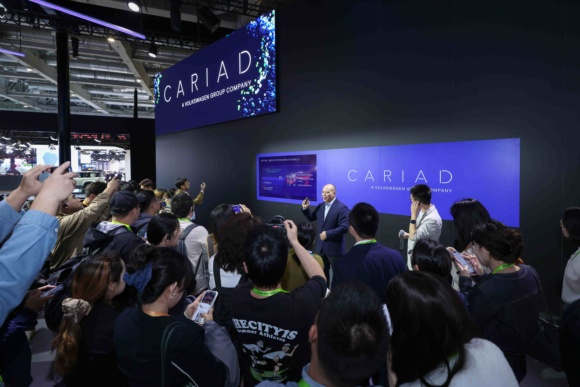The German automaker is betting on local R&D, chips and software to rebuild its edge in the world's toughest EV market.

Photo from Volkswagen China
by ZHOU Shuqi
On the eve of the 8th China International Import Expo (CIIE) in Shanghai on Nov.4, Volkswagen Group held a rare board meeting outside its German headquarters in Wolfsburg — a move underscoring how central China has become to the company's global strategy.
Volkswagen is doubling down on its largest market as it races to catch up in electric and smart vehicles. At this year's CIIE, CEO Oliver Blume announced a US$200 million joint venture with Horizon Robotics, a Beijing-based autonomous-driving chip developer, to co-design system-on-chips (SoCs) for Level 3 and higher autonomous models.
The chips will be developed by CARIZON, Volkswagen's joint venture between its software unit CARIAD and Horizon Robotics. Production is expected within three to five years, with each chip delivering 500–700 TOPS of computing power. Volkswagen said the deal marks a "new phase" in the local development of its driver-assistance systems.
Blume said China plays a pivotal role in Volkswagen's progress toward next-generation mobility. "By designing and developing the system-on-chip here in China, we are taking control of a key technology that will define the future of intelligent driving," he said.
Building a Chinese innovation hub
Volkswagen's investments in China have now exceeded 100 billion yuan (about US$14 billion), covering chips, software and vehicle platforms. In 2023, the company set up the Volkswagen China Technology Company (VCTC) — its first R&D center outside Germany with full authority over vehicle architecture, design and procurement.
To narrow its software gap with local EV makers, Volkswagen has given its China operations greater autonomy. CARIAD China CEO Han Sanchu said the new China Electrical Architecture, or CEA, is more than a technical upgrade but a complete overhaul of how Volkswagen develops cars. He noted that while the company was once known for modular hardware, it now aims to build the same strength in software.
The CEA platform will debut in 2026 on four entry-level EVs based on Volkswagen's China Main Platform (CMP), the first of which was unveiled at the CIIE and will be produced by FAW-Volkswagen. The system will later extend to plug-in hybrid and combustion models, eventually covering about 80% of Volkswagen's China lineup.

High stakes, high risk
Volkswagen's aggressive localization push carries significant risks.
Auto analyst MEI Songlin warned that if Volkswagen fails to roll out more competitive models soon, its profits in China could fall sharply, putting the company at risk of sliding into a second-tier brand.
Han acknowledged the challenge but said the company must act decisively. "If we don't establish a full-stack development system now, we could collapse within a year," he said. The CEA platform, he added, allows modular upgrades, reusable components and scalable functions — critical for long-term maintainability.
To accelerate progress, Han put his 500-member CARIAD China team through internal coding exams and arranged hands-on training with XPeng Motors, a local partner. People familiar with the collaboration said XPeng provided "one-on-one mentoring" to transfer its software expertise.
The CEA system took just 18 months from concept to prototype — roughly half the industry average — cutting development costs by 40% and boosting efficiency by 30%, according to Volkswagen. The group's next step is an entirely self-developed China Scalable Platform (CSP) for future EV models, independent of XPeng.
Financial pressure and strategic urgency
Volkswagen's localization drive comes amid growing financial strain. In the third quarter of 2025, the company reported a €1.07 billion net loss, its first quarterly loss in five years, even as global deliveries edged up 0.8% to 2.2 million units.
Ahead of the CIIE, Blume and Ralf Brandstätter, CEO of Volkswagen Group China, visited the automaker's Hefei base to review the upcoming ID.EVO, seen as a key test of its electric transition.
Brandstätter later wrote that the leadership team had held frank discussions on ways to accelerate transformation and deliver stronger results in China. The company's future now depends on whether its deep localization drive will be enough to reclaim its edge in the world’s most competitive EV market.